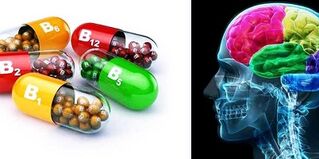
The human brain is an extremely complex device in our body. The center of the nervous system consumes up to 25% of all energy expenditure, and its weight accounts for up to 2% of total body weight. In order to make the brain activity full and uninterrupted, the supply of carbohydrates, protein and polyunsaturated fatty acids must be ensured. Food should contain amino acids, minerals and vitamins for the brain and memory.
Brain connection
Let us begin to review the essential B vitamins of the central nervous system. They are affected by the following factors:
- They contain nitrogen;
- is considered water-soluble;
- has a similar effect on the body;
- Usually found together in the same product;
Initially, after the discovery, the scientists thought they were dealing with only one vitamin, and over time they discovered that they were different compounds with similar properties. 7 essential vitamins for group B:
- B1 or thiamine-Clear mind and strong memory. In addition, it reduces fatigue because it participates in almost all metabolic processes in the body related to energy production.
- B2 or riboflavin-Affect the quality and speed of brain response, participate in the formation of red blood cells, hemoglobin synthesis and iron absorption. Riboflavin is responsible for the activity of the adrenal glands and affects vision.
- B3 or niacinis necessary to improve concentration and improve memory. Protect us from stress. Help red blood cells transport oxygen.
- B5 or pantothenic acidis an essential element that allows the production of neurotransmitters that transmit electrochemical impulses between neurons. Pantothenic acid is necessary for the synthesis of fatty acids, which are responsible for long-term memory.
- B6 or pyridoxine-also involved in the production of neurotransmitters. It also helps absorb amino acids needed for normal brain function.
- B9 or folic acid-Improve memory and the speed of thinking processes. She is responsible for the formation and function of the immune and circulatory system. For the healthy development of the fetal neural tube, it is especially important in the first trimester of pregnancy.
- B12-Helps form the nerve sheath of neurons, responsible for the transmission speed of nerve impulses. Involved in the formation of red blood cells, which means it provides oxygen to the brain.
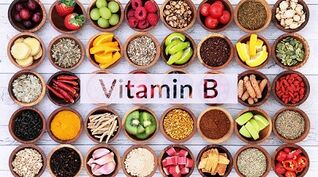
Antioxidant
Billions of living cells in our body are constantly being attacked by free radicals, which are one or more molecules that lack electrons. Without elementary particles, cells will not be able to perform their functions.
These vitamins can improve memory and brain activity.
Vitamin C is also used by the body to make neurotransmitters and brain cells. The stability and assimilation of group B substances depend on their content.
Vitamin E is necessary for Alzheimer's disease and is characterized by the following symptoms: mood swings, memory loss, irritability, and aggressiveness. He can increase the benefits of ascorbic acid and prevent its overdose.
Trace elements, amino acids, polyunsaturated fatty acids
Omega-3 fatty acids have an effect on brain activity. They are polyunsaturated fats that our body cannot synthesize on its own. Eating foods containing omega-3 can help protect the brain from cognitive damage and improve concentration and memory.
Protein is a building material needed by human cells. It is composed of amino acids.
Most brains need:
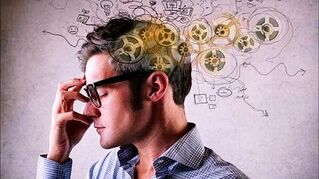
- Glycineis an essential amino acid (ATA). Although it is synthesized by the human body, food must be provided. Glycine can normalize mental and emotional states, stabilize brain activity, and neutralize the effects of alcohol to some extent. The ATK can improve sleep and regulate biological rhythms.
- Tyrosine and Phenylalaninecan fight depression and anxiety. In a healthy body, they can eliminate the symptoms of chronic fatigue, improve memory and thinking processes, and increase pain thresholds. Phenylalanine is the main component of phenethylamine and can help you fall in love. In turn, tyrosine is the most effective antidepressant among amino acids. Thanks to this ATK, not only the symptoms of depression disappear, but also the symptoms of the premenstrual cycle are alleviated. These amino acids help overcome caffeine addiction.
- Tryptophan-Sufficient amount in the body can relieve headaches and irritability. Tryptophan helps reduce aggression and is used to treat children with ADHD. The comprehensive treatment of schizophrenia and neurosis must take drugs containing this substance. Will get drunk during the treatment of anorexia and bulimia. To some extent, after taking the amino acid, the depression disappeared.
For normal brain function, you need to consume enough amino acids with food. The function of the central nervous system is not without trace elements.
Zinc deficiency can lead to depression and the development of neurological diseases-Alzheimer's disease and Parkinson's disease. Magnesium can improve learning ability and memory. Its deficiency can cause headaches, depression and epilepsy. Copper is essential for the brain to control nerve impulses. If it is not enough in the body, then neurodegenerative diseases will develop.
Nebula and abnormal brain function are obvious signs of iron deficiency.
Which products contain more useful things
There is no doubt that it is natural for people to take in the necessary vitamins from natural foods to improve the memory and function of the cerebral cortex. Let us consider the normal performance that is most suitable for cognitive function.
Peas have the highest vitamin B content. It has beneficial effects on all brain functions. Behind the peas is oatmeal-an anti-insomnia helper, a good antidepressant. Then there are walnuts, brown rice (dark crust), green vegetables, meat and dairy products.
Eating fatty fish will help improve brain function. It contains a lot of omega-3 fatty acids, which can stimulate memory and improve information perception.
The fat content of the human brain is 60%, similar to omega-3, so these acids can be used to produce nerve cells. If you eat enough of this substance, you can stop mental decline and avoid neurodegenerative diseases in old age. A lack of omega-3 in the body can cause depression and reduce a person's ability to work.
Coffee contains caffeine and antioxidants, which are good for brain activity. Therefore, a cup of aromatic beverage can not only refresh your mind in the morning, but also has a good effect on brain activity.
Caffeine allowed:
- Cheer up;
- Improve alertness by preventing the synthesis of adenosine that causes sleepiness;
- Increase the density.
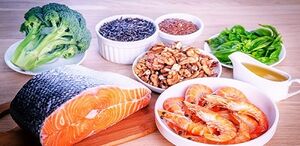
Despite the controversy surrounding aromatic beverages, the caffeine and antioxidants in coffee make the brain work more efficiently. Drinking coffee in moderation can reduce the risk of neurodegenerative diseases. However, unfortunately, people with high blood pressure are prohibited from drinking this beverage.
Blueberry is another useful and unique product against nerve cell aging and brain disease development. This is due to the high antioxidant content in berries. These substances help improve concentration and sometimes contribute to short-term memory loss.
Turmeric, the main ingredient in curry, not only gives food a unique flavor, but also gives life a unique flavor. Curcumin helps stimulate blood circulation and memory.
Turmeric is very beneficial because it:
- Stimulate the growth of brain cells;
- Fight against depression and depression: Curcumin affects the synthesis of "mood hormones" (serotonin and dopamine);
- Stimulates memory, which is especially important for patients with Alzheimer's disease.
By adding turmeric to tea and curry foods, curcumin can be used to the maximum.
Cauliflower and other vegetables that most children don't like contain a lot of nutrients. One hundred grams of plant contains more than 100% of vitamin K every day: the body uses it to produce fat, and fat is abundant in brain cells.
Vitamin K keeps alert, and the antioxidants in broccoli help the body resist brain damage.
Pumpkin seeds are also a powerful antioxidant. They contain many trace elements: zinc, magnesium, copper, iron. It is absolutely necessary to add pumpkin seeds in your diet to improve the quality of mental activity.
Eating a piece of dark chocolate or drinking cocoa powder is a good thing. These foods are rich in flavonoids, antioxidants and caffeine, which can improve mood and slow down brain aging.
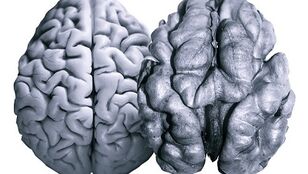
Nuts supplement foods that are good for the brain. In addition to B vitamins, they are also rich in: omega-3 fatty acids, antioxidants, and vitamin E. Perhaps the external similarities between walnuts and the human brain are not accidental?
A daily intake of a kind of orange in the diet can provide the human body with the vitamin C needed daily, and can also protect the brain from free radicals, thereby preventing brain aging. Tomato, kiwi, guava, sweet pepper and strawberry are rich in vitamin C.
Eggs are an excellent source of vitamins, folic acid and choline. They can prevent brain aging and depression.
Although the effects of eggs on the human body are not fully understood, people have long known the benefits of eating eggs.
Green tea can also improve brain function. It is high in caffeine and L-theanine, which can help reduce anxiety, reduce fatigue and relax the body and mind. Among other things, green tea helps improve memory.
In short, it must be said that a comprehensive and balanced diet is a relatively cheap and effective way to improve human brain activity and memory.
It is best to eat fresh organic food and maintain a daily fluid intake.
Our nutrition directly affects the stable function of the brain. In order to maintain its vitality, in addition to nutrition, you also need to exercise regularly and train your cognitive abilities.
Pharmacy drugs
In the modern world, it is difficult to provide oneself with natural vitamins. During food processing (sterilization, preservation, exposure to high and low temperatures), most of the nutrients are lost. The way out of this situation is to use analogs synthesized in the pharmaceutical industry to compensate for the missing elements.
The memory and brain function vitamins for adults and children can be purchased at any pharmacy. A method for tablets containing a complete vitamin complex necessary for the brain is very popular. It is usually combined with trace minerals. A partially comprehensive approach was also used, which included a group of vitamins, such as group B.
also produces preparations with one active ingredient (folic acid, vitamin C). Their advantages include low cost, less chance of overdose and allergic reactions.
Some medicines contain vitamin supplements to enhance memory and concentration.
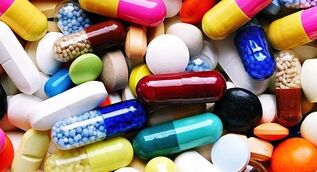
The amino acids and omega-3 acids that stimulate the brain are highlighted separately.
Medications that improve brain activity have a beneficial effect on the thinking process itself, enhancing concentration and improving memory. These vitamins can keep people calm and balanced. The elderly need to take dietary supplements and vitamins, because they can regulate brain tissue and help restore the elasticity of blood vessels.
Don’t expect vitamins to be effective soon. Changes can be seen after conventional drug treatment.
Age-related cognitive decline is waiting for everyone who lives long enough. But timely preventive measures will keep the brain active in the future.
You need to have a balanced diet and try to eat more natural foods containing antioxidants and vitamins for intellectual activity. In the period of high mental stress and seasonal lack of fresh fruits and vegetables, in the old age, it is desirable to use synthetic drugs to supplement the vitamin deficiency.








































































